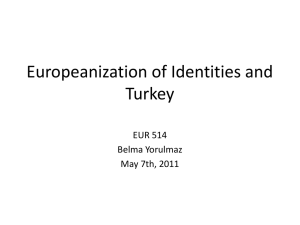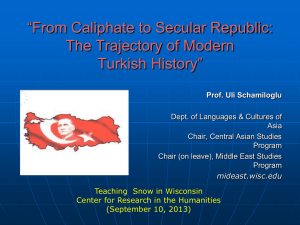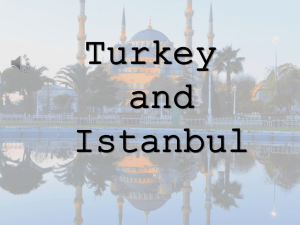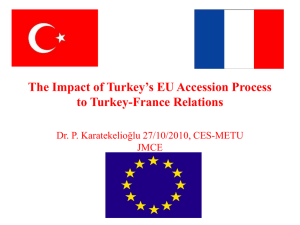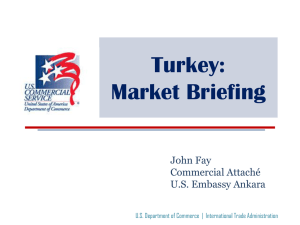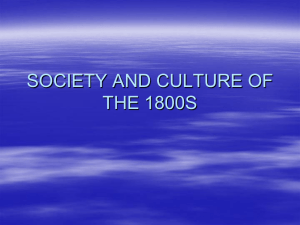turkey`s 2001 crisis
advertisement
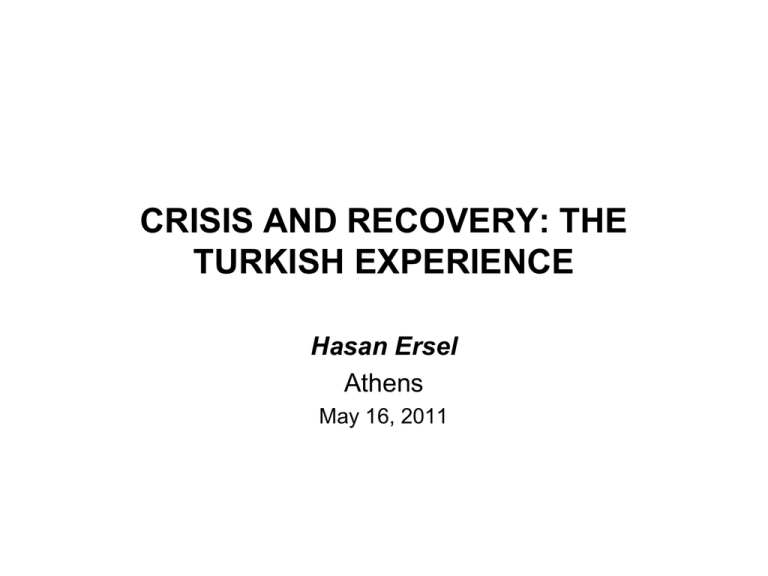
CRISIS AND RECOVERY: THE TURKISH EXPERIENCE Hasan Ersel Athens May 16, 2011 TURKEY’S 2001 CRISIS • The 2001 Crisis was a traumatic event. It drastically affected the behavior of all economic agents… • …Including the government! • A closer examination of these changes may help to understand the rather strange behavior (a deep V) of the Turkish economy during the 2008+ crisis TURKEY: GROWTH WITH CRISIS • Major Crises: 1929, 1958, 1978, 2001 and 2008 plus less significant ones… • Most of these crises were home made. Exceptions are 1929 and 2008 global crises. • Turkey’s 2001 crisis may be interesting. Turkey launched and implemented (!) a comprehensive and socially costly program to deal with the crisis. The recovery was strong and almost everything seemed fine until the 2008+ global crisis…Except high rates of unemployment. SOME HISTORICAL FACTS 1) 1946 was the last year that Turkey had a trade surplus! Since then, the current account deficit is a major problem for Turkey 2) Turkey moved smoothly to “democracy” in 1950, but failed to become a “liberal democracy” ( i.e. a political system marked not only by free and fair elections, but also by the rule of law, a separation of powers, and the protection of basic liberties of speech, assembly, religion and property) since then. Thus there is a “democracy gap” which should be taken into account to explain the economic policy decisions. 2001 CRISIS AND ITS AFTERMATH: SOME QUESTIONS i) How Turkey was able to launch a comprehensive, socially costly and politically risky program to deal with this crisis without much resistance? ii) To the surprise of almost everybody, the program continued to be implemented even after the 2002 elections, under a new government formed by a newly established party, AKP (Justice and Development Party). Why? iii) How Turkey recovered rather quickly and exhibited a strong growth performance in the aftermath of the 2001 crisis? iv) Nevertheless the 2008 global crisis demonstrated that Turkey was still highly vulnerable to external shocks. Why? THE DISAPPOINTED SOCIETY… • 1990s: The Lost Decade! (extreme policy failures, high inflation, economic instability, incompetence and corruption) • 1999 Earthquake and its political implications (A major blow to the credibility of the “mother” state) • The 2001 Crisis: Crisis under the IMF program. (GDP declined three consecutive quarters at a rate of 7,6%.) WITH NO RETURN… • Arab commander Tariq ibn Ziyad, when landed to Giblatar in A.D. 711, burned his ships to convince his army that there is no return. • Turkey was in the same situation in 2001, except the fact that Tariq ibn Ziyad knew what he was doing, while Turkey ended up in a similar situation not by intend but through complete loss of confidence of the public to anything that reminds the past (economic policies, politicians, bureaucracy, etc.). THE CREDIBILITY OF THE PROGRAM AND OF THE POLITICANS • The 2001 Program was designed by a team headed by Kemal Derviş (then vice president at the World Bank). Although he was appointed to a ministerial position without party affiliation, he was considered as a technocrat. • He and his team were considered technically competent. • The public did not have the same positive feelings for the coalition government that launched the 2001 program. • In the election in November 2002 all the three coalition partners were not able even to get sufficient votes to be represented in the new parliament! THE ECONOMIC POLICIES OF THE NEW GOVERNMENT • The new government, after a brief period of hesitation, decided to continue with the program. • Surprising almost all observers, the AKP government took the Turkey’s EU membership issue seriously. Therefore the EU negotiation process became a second anchor for economic policies. • The credibility of the policy framework and, in turn, of the government increased. That induced the government to implement the program faithfully. Budget deficits reduced. Privatization revenues and the sizeable primary surpluses that were created used to reduce public debt. (Gross public debt to GDP ratio was brought down from 74% in 2002 to 39,5% in 2008). ECONOMIC RECOVERY UNDER THE AKP GOVERNMENT • The AKP Government was quite successful in stabilizing the economy. Inflation was brought down to single digit level from 72%. • Exports increased; unprecedented levels of capital inflows (notably in the form of FDI) were recorded. • A major breakthrough took place in privatization. • The government was able to allocate more resources to disadvantaged groups through transfer expenditures in the budget and by mobilizing the resources of the municipalities. THE LUCK FACTOR… • The AKP government implemented the 2001-Program that aimed at “recovery under stability” fairly well. • However global economic environment was also extremely favorable. World economy was booming, world trade was expanding and there was immense liquidity available. • The country (and the government) was lucky: Keeping eye on economic stability was sufficient to enjoy the externalities created by the global economic environment. SHORT LIVED REFORMISM OF THE AKP GOVERNMENT • In its first few years the government seemed enthusiastic about launching reforms required by negotiations with the EU. However the government lost its appetite in by 2006. • Two reasons: i) Apparent increase in opposition to Turkey’s membership within the EU. ii) Increase in the social costs of reforms. The government, rationally, started from those whose social cost is low. They are exhausted rather quickly. • Result: One of the anchors is no more available. Credibility of the economic policy is shaken. FROM REFORMISM TO CONSOLIDATION • The severe political cost that the coalition government paid, after launching socially costly structural reforms in 2001 was fresh in the memory of the new government. • Therefore, the AKP government, instead of introducing a new program to complement the transition program of 2001, chose to adopt it to new conditions. • Post 2006 era policies were aimed at giving priority to stability to consolidate the achievements. • Result: Commitment to the stability remained as an anchor. LESSONS FROM THE CRISIS-1 “DON’T TRUST THE SYSTEM” • The 2001 crisis was a systemic failure. All agents learned that the they can not rely on system’s capability to protect them against such shocks. • Survival after shock depends mostly to the individual institutions‘ strengths and individual crisis management capacities. LESSONS FROM THE CRISIS-2 “BE (OVER-) CAUTIOUS” • In the post 2001-crisis period Banks: High capital adequacy and liquidity ratios were maintained, more emphasis was placed on hedging against exchange rate movements. Corporations: Improvement in the financial statements despite the fact that the corporate sector was enable socialize its burden through the so-called Istanbul approach. The Government: Continued emphasis on stabilization policy. to place a strong LESSONS FROM THE CRISIS-3 “BE PATIENT” • Rest of the private agents (households, small enterprises etc) were left unprotected against the damaging effect of the crisis. They were negatively affected by the unfair distribution of the costs of the recovery program. (Democracy “gap”) • However, the existing “democratic” mechanism enabled these economic agents, ex post, to improve their well being and compensate some of the their losses during the recovery. (Decline in unemployment, improvement in the income distribution, etc) LESSONS FROM THE CRISIS-4 “Who needs structural reforms?” • Structural reforms are costly and increase the uncertainty perceived by economic agents. Undertaking them may hurt the short term growth performance of the economy. • Political and economic costs of the structural reforms discouraged the government to introduce a new economic program to launch the Turkish economy on a new growth path. • The myopia of the government was shared by the public. Therefore there was no public demand for such reforms. THE 2008+ CRISIS • The global crisis hit Turkey in the last quarter of 2008. • Turkey was one of the worst affected economies in the world. The GDP declined for four consecutive quarters. The rate of decline in GDP was 7,9%. • The recession was longer and GDP decline was higher than 2001 crisis. • The government was late in appreciating the severity of the crisis. The scope of its intervention was limited and most of the measures taken became operational after the economy started to move ahead. • But the economy recovered! Turkey was the fourth fastest growing economy in 2010! FACING THE GLOBAL CRISIS • Since no major economic reform was undertaken, the mode of operation of the economic system remained unchanged. • 2001 crisis taught all the agents that the existing system is not capable of protecting them from such shocks. • Therefore they all acted (over-) cautiously; including the government. (The government was partially misguided by its own overconfidence concerning the resilience of the economy) USING 2001 LESSONS-1 BANKS AND CORPORATIONS • Banks, reacted immediately by curbing their loans, strengthening their liquidity and foreign exchange positions. They were able to transfer the shock to other agents by temporarily scaling down their activities. • The corporate sector felt the global crisis first through finance and then, more strongly, through trade channels. The corporate sector reacted to these by reducing its output, employment and trade credits. USING 2001 LESSONS-2 REST OF THE PRIVATE AGENTS • The reaction of banks and corporations, jointly, led to a jump in unemployment and created serious financial difficulties for households and for small enterprises. • Household incomes were adversely affected due to increase in unemployment as well as rather steep decline in real wages. • The decline in trade credits was fatal for many small enterprises. A large number of such enterprises had to close down. • Households and small enterprises, again, became the major victims of the crisis. ECONOMIC POLICY OF THE GOVERNMENT • The government, did not try to fight with recession by significantly increasing public expenditures. The increase in budget deficit (to 5,5% which is not dramatic) was mostly due to decline in tax revenues. • The government, already discouraged in undertaking reforms, instead relied on the expectations channel and tried to undermine the expected costs of the shock in the eyes of the public. FREE FALL… • The economic activity collapsed until the surviving economic agents can demonstrate their capability of standing on their foot. • This was achieved at the expense of an unprecedented increase in unemployment and widespread close downs, notably, among small enterprises. • At some point, as individual agents’ credibility was restored, market forces started to work in the opposite direction. Economy started to move ahead. WHAT HAPPENED IN 2009-2010? • Since Turkey missed its chance to launch structural reforms after the 2001 crisis, it had to face the 2008 shock with almost the same structural weaknesses. • The 2001 crisis was fresh in the memories of all economic agents and they acted upon the lessons they drawn from it. Their mutual mistrust to the system’s protective capacity led them to react in a selfish manner. • This behavior both increased the social cost of the 2008 shock but also enabled the economy to achieve a rather steep increase in the GDP (9,9% in 2010) GOVERNMENT’S POLICY • The cautious stance of the government strengthened its commitment to the economic stability. • The government was aware of the fact that it will have to deal with social pressures to increase support to the socially disadvantaged. (Especially during an election year, that is 2011) • However there is a problem: In the post-2001 period the sharp decline in interest expenditures allowed some flexibility for changing the composition of public expenditures in favor of such transfers. It was not the case any more. LOOKING AHEAD • The economic recovery did not bring down unemployment even to its pre-crisis level and it also created a high current account deficit (6,6% of the GDP in 2010). Both developments are threatening for the economic (social and political, as well) stability. • The Turkish experience indicate that postponing structural reforms in favor of stability may be destabilizing. • The new government (after the election) faces a major challenge: It has to convince the (over-) cautious economic agents to the need for structural reforms, when the EU anchor is no more available. THANK YOU

